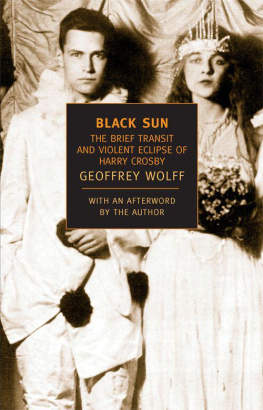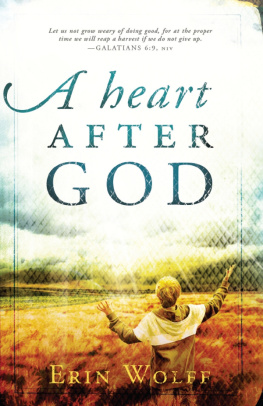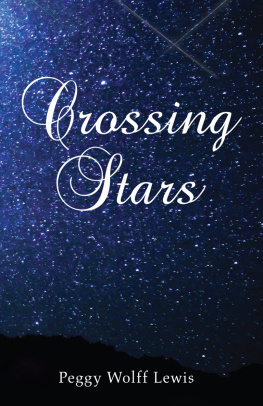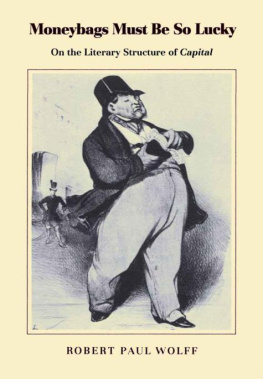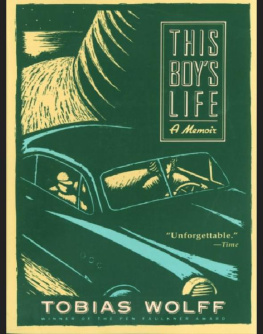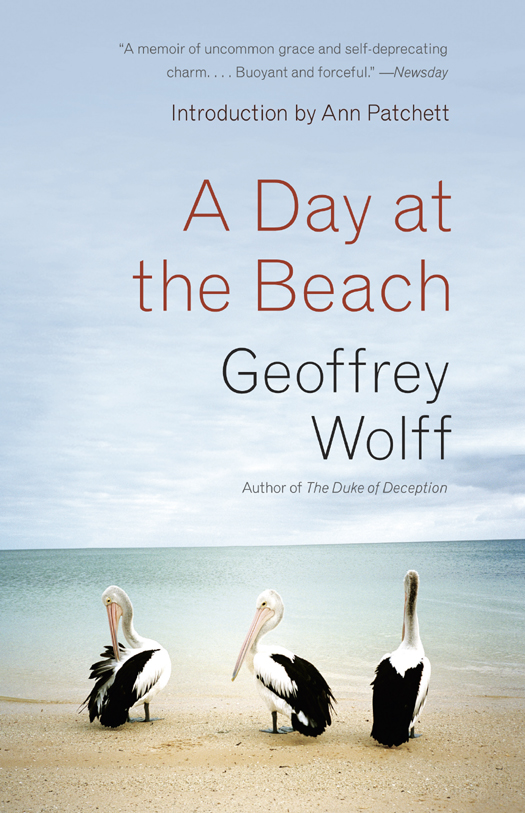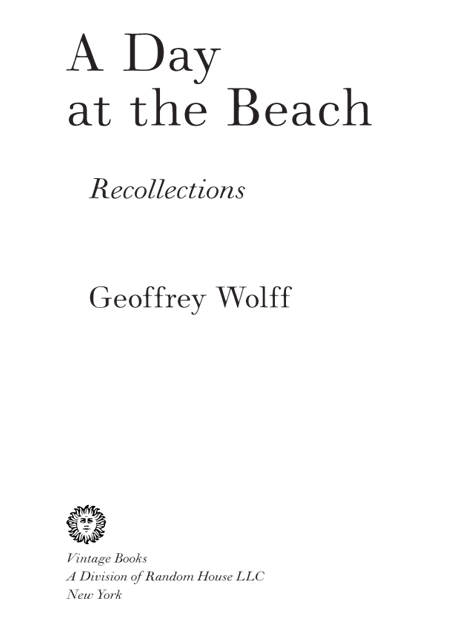SECOND VINTAGE BOOKS EDITION, NOVEMBER 2013
Copyright 1992, 2013 by Geoffrey Wolff
Introduction copyright 2013 by Ann Patchett
All rights reserved. Published in the United States by Vintage Books, a division of Random House LLC, a Penguin Random House company, New York. Originally published in the United States by Alfred A. Knopf, a division of Random House LLC, New York, and in Canada by Random House of Canada Limited, Toronto. Originally published in hardcover by Alfred A. Knopf, a division of Random House LLC, in 1992.
Vintage and colophon are registered trademarks of Random House LLC.
Portions of this work were originally published in the following: An Illuminated History of a Model Friendship (now titled in The San Diego Reader (later published in Family: Pantheon, 1996).
Cover design by Mark Abrams
Cover photograph Tobias Titz/ fstop/ Corbis
The Library of Congress has cataloged the Knopf edition as follows:
Wolff, Geoffrey.
A day at the beach: recollections / Geoffrey Wolff.
1st Vintage books ed.
p. cm.
1. Wolff, Geoffrey, 1937Biography. 2. Authors, American
20th centuryBiography. I. Title.
PS3573.053z462 1993
813.54dc20
[B] 92-50627
Vintage ISBN: 978-0-8041-7009-3
e-Book ISBN: 978-0-307-82926-9
www.vintagebooks.com
v3.1_r1
Praise for Geoffrey Wolffs
A Day at the Beach
Elegant. Provide[s] an upbeat counterpoint to the troubled father-son relationship chronicled in The Duke of Deception. In Geoffrey Wolff, America is blessed.
Los Angeles Times
Honest and touching. [Wolff explores] the romance of building the clean well-lighted sentence.
Chicago Tribune
Exhilarating. Conjures up a diversity of scenes, set in locations ranging from Istanbul to Greenwich Village to a Caribbean beach.
Publishers Weekly
Wolff is one of the all-time great yarn spinners, and the texture of his prose is a marvel.
Frank Conroy
A Day at the Beach is at once charming and deeply moving. Anyone who admired The Duke of Deception will be drawn to this compelling memoir.
Richard Selzer
Its impossible to read Geoffrey Wolffs essays without being reminded what good writing is for. The complexities, the punishments, the exuberance of having a full life are his subject. There is no parsimony here, no falseness, no evasion. There is just the deeply satisfying familiarity of Wolffs voice. You sense the completeness of the man in the writer.
Verlyn Klinkenborg
A Day at the Beach sneaks up on you in several places with remarkably steady views of American values in the face of mortality. It is an absorbing book, literate, full of life and marvelous information.
Thomas McGuane
Wolff has ripened through the years to a generous empathy and a supple specificity that mark him as a very special talent. As a story-telling essayist, he can be bravura, gentle or informative, balancing mercy with incongruity. One reads him wishing he were in the room.
Edward Hoagland
Geoffrey Wolff
A Day at the Beach
Geoffrey Wolff is the author of six novels and six works of nonfiction, including the memoir The Duke of Deception, which was a finalist for the Pulitzer Prize. In 1994 he received the Award in Literature from the American Academy of Arts and Letters. From 1995 to 2006, he directed the Graduate Program in Writing at the University of California, Irvine. For his writing, he has received fellowships from the Guggenheim Foundation, the National Endowment for the Arts, and the American Academy in Berlin. He lives in Bath, Maine.
ALSO BY GEOFFREY WOLFF
The Hard Way Around
The Edge of Maine
The Art of Burning Bridges
The Age of Consent
The Final Club
Providence
The Duke of Deception
Inklings
Black Sun
The Sightseer
Bad Debts
For my deckhands
and yard-maintenance engineers:
you know who you are
Contents
Authors Note
Anyone old enough to read these words must agree that second chances are as good as luck gets. Ann Patchetts infectious and unrelenting enthusiasm, put into action by the editorial suggestions of LuAnn Walther and Vintage, have given me and mine another day at the beach. Encouraged as well by Maile Meloy and Binky Urban, I have added to this collection of personal essays Heavy Lifting, an account of my nearly botched second chance at love and laughter with Toby, my remarkable brother.
The characters who recur in these narrativesmy sons, Justin and Nicholas, my wife, Priscillahave thrived and kept me close and given me what I hope will be new readers: Ivan, Ruby, Rosemary and Oscar. Readers of this collections title essay may be relieved to know that the St. Jude aortic heart valve (Model 23A-101, described herein) has since 1987 managed to avoid inclusion on Consumer Reports recall list.
Introduction
by Ann Patchett
Write what you know is a piece of literary advice that is regularly dispensed to would-be writers, but what we writers so often lack is an interesting life from which to draw. The teacher would be better off dismissing the class before it ever got started. Get out there and lead fascinating lives, dangerous, meaningful, beautiful lives, he should tell us. Give yourself time to digest those experiences, and then come back and write what you know.
But that might not work either, because people who know how to live often dont have a clue how to write. Theyre too busy hoisting a sail or carving a ski slope to learn how to string two good sentences together. Its the rare writer who has lived both the life of the mind and a life of adventure, and who doesnt take himself too seriously doing either. Geoffrey Wolff is that writer. His brilliant essay collection and memoir, A Day at the Beach, is a marvel of the first person: a restless mind recounting, examining, and riffing on what it knows. Like the storytellers in the market in Marrakesh from his opening essay, Apprentice, hes an entertainer, ready to compete with snake charmers and fire-eaters for your attention, and also to make you think about how and why your attention has been held. Hes both performer and critic, often an amused self-critic. He turns over the incidents of his lifeamateur theatricals in Istanbul, say, or trying to drop anchor in the rain while another sailboats pipe-smoking skipper offers adviceto expose the humor and the pathos in them, and occasionally the lesson, too.
Interesting lives, of course, should best be started young, as Wolff demonstrates in The Great Santa. While childhoods of either nerve-racking poverty or lonesome wealth can be moving, the childhood that swings violently between these two poles is the most interesting: extravagant gifts followed by no gifts at all, dismal boarding houses followed by picturesque country houses, everything wagered and won and lost and lost and lost. If youre lucky enough to have avoided the stability and complacency brought on by regular meals and consistent love, you might have some great material, but dont rest on your laurels. That alone will not be enough to sustain a lifetime of work. The best possible advice for young writers might be to follow Wolffs example and go to Turkey to teach literature, dabble in hashish, rub shoulders with so many spies that you will be accused of being one yourself, head for Cambridge on a prestigious fellowship, wreck your motorcycle, drink too much, love too well, become a newspaperman and a devoted husband and father, have your chest cracked open, climb the Matterhorn (or try), and then sail a little boat up the Eastern seaboard, battered by storms and boarded by Coast Guard agents looking for drugs. In short, take a page from these pages and live so large that you write your life across the night sky in stars.


